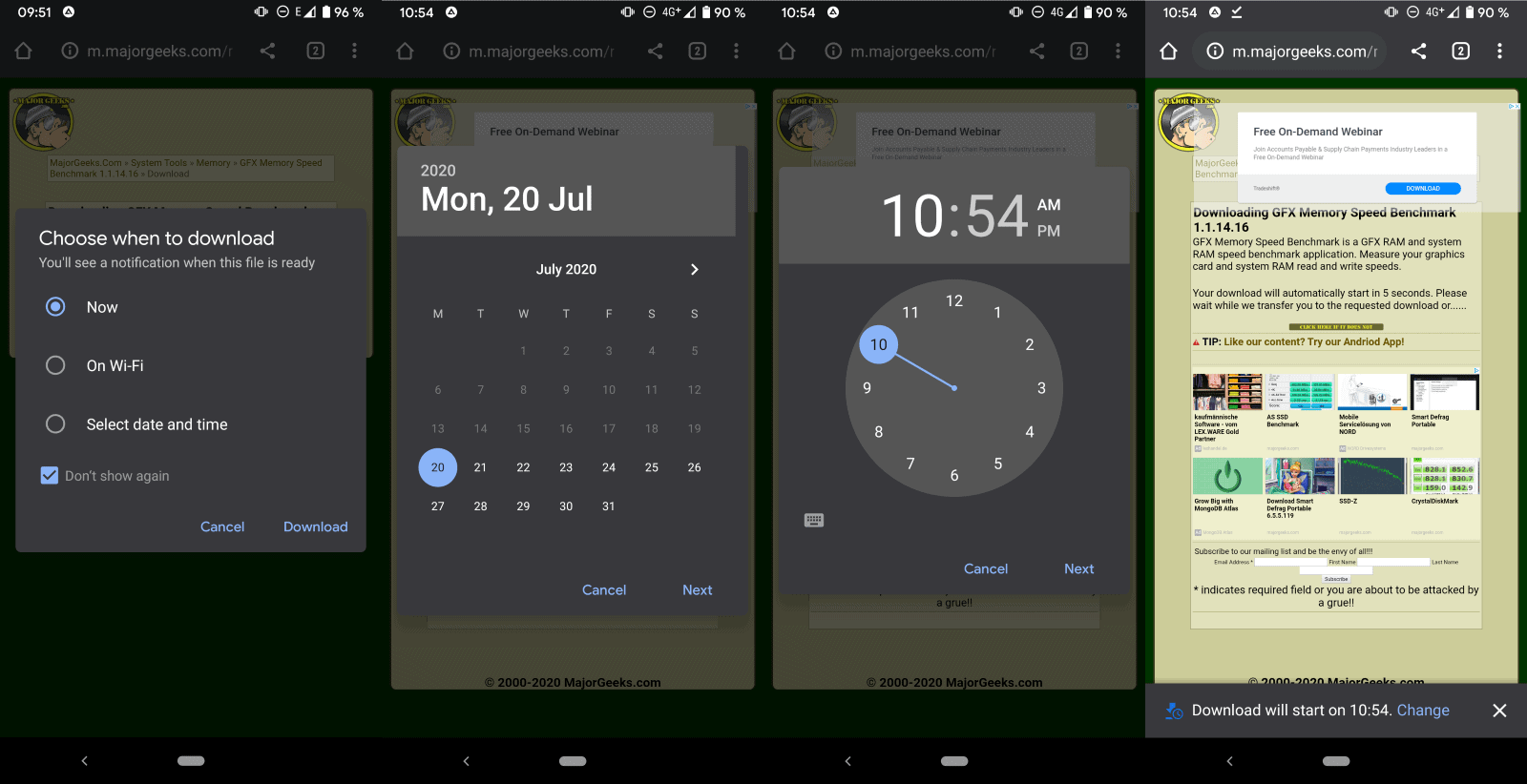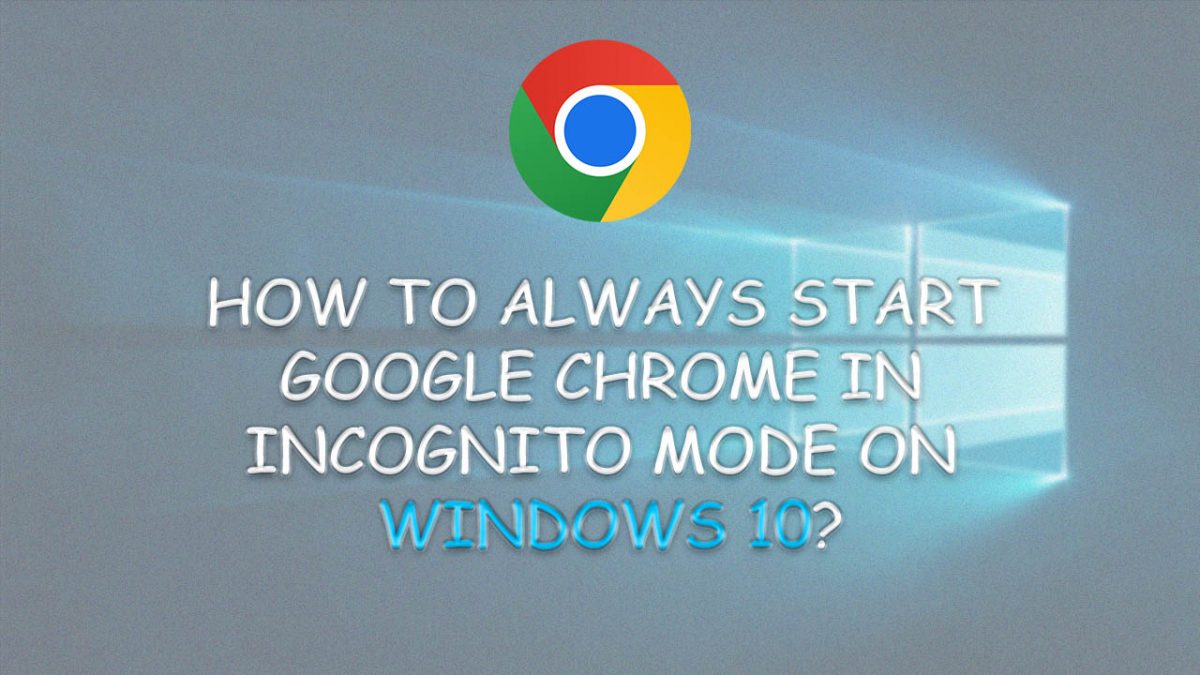Chrome for Android: new download options including scheduling

Google is working on improving the download options provided by the company's Google Chrome web browser for the Android operating system.
Current versions of Chrome for Android offer little when it comes to downloads. Downloads start immediately when you select to download files, and while that is probably wanted in most cases, there are cases where users may not want downloads to start immediately.
A prime example is when the device is connected to a mobile network and not a wireless network. There may also be situations where you don't want downloads to start right away, e.g. when you are still connected to a school or work network with your device. While you could wait before you start the download, other options may be welcome to address these situations.
Google engineers added a new experimental flag to the latest Chrome Canary version that introduces new download options. Once enabled, Chrome will display several options to the user when files are selected for download. These let users start the download right away, start it when the device is connected to a wireless network (if it is not at the time), and to schedule the download.

Let's take a closer look at the available options and how to enable the feature in Chrome.
- Make sure you run the latest version of Chrome Canary for Android; the version that I used for the test is 86.0.4204.0.
- Load chrome://flags in the web browser's address bar.
- Search for "Enable download later".
- Set the experimental feature to Enabled.
- Restart the Chrome browser on the Android device.
Google Chrome for Android will display a prompt when you start downloads in the browser after the restart. The prompt provides you with options to start the download at that point in time, wait until the device is connected to a wireless network, and to schedule the download.
The first two options are self-explanatory, the third resembles functionality known from Download Managers. When you select it, Chrome asks you to pick a date and time for the download. It will schedule the download and start it at the selected date and time.
Chrome users may dismiss the prompt to restore the default downloading functionality of the browser.
The scheduled downloads are listed on the browser's downloads page.
Closing Words
Experimental features may come and come at any time, and it not 100% ensured that the download scheduler and other download options will make it into stable Chrome. The options may be useful in some situations, e.g. when starting downloads while connected to a mobile network; the scheduling on the other hand, I'd estimate that it would not become a very popular feature.
Now You: What would you like to see in your browser's download manager? (via techdows)
























Until they provide a proper bottom bar UI option (which they’ve recently removed the flags for), I’m finding Chrome very cumbersome to use. Don’t care about niceties like download scheduling (though I could see some niche use for this kind of function).
Neat feature, but I’d strongly prefer using it in the spyware-free mobile version of Chrome:
https://www.bromite.org/
In general, however, it is always useful to keep up with the news, knowing that any useful functionality that is being added to Chrome will also be coming to its non-nefarious variants.
Thumbs up for the article.
@Iron Heart
Some of us appreciate your posts. Keep them coming.
BTW, what is your opinion on the new android Firefox web browser?
https://play.google.com/store/apps/details?id=org.mozilla.fenix&hl=en_US
@Anonymous
The Pros and Cons, let’s start with the Pros:
– Speed and stability: This was a category where Firefox on Android used to be horrible (and still is horrible on the stable channel), but this Nightly, which will move to the stable channel soon, fixes that. It is now on par with Chromium in that regard.
– Extensions: The number of extensions Nightly currently supports is limited, but Mozilla has said that it will be supporting all Firefox extensions when it reaches stable, so this sets it apart from any other mobile browser – contrary to the desktop, extension support is a rare characteristic on mobile. Huge plus right there!
– Privacy: It’s better than Google Chrome (which is the default browser on Android) of course, but this is not a very high bar anyway. You can make some useful pro-privacy modifications in Firefox’s settings, more than what Google Chrome allows in its settings. However, we’ll also have to discuss privacy in the Cons section again as well, I merely put it here to make it clear that it is better than the default browser.
– about:config – Provided it’s also available when this reaches stable, it’s a plus, because it allows for granular control and will help you mitigate some of the negative privacy aspects I will talk about in the following.
Cons:
– Privacy: Firefox has some nasty stuff enabled by default, e.g. telemetry, Pocket, Firefox Experiments, and its website-facing privacy also isn’t great, it allows prefetching, session identifiers, TLS 0-RTT data, HTML beacons etc. by default, fingerprinting protections (aside from a minor number of scripts being blacklisted by the tracking protection) are turned off by default, and the built-in tracking protection is generally weak (merely uses the Disconnect list, which is not the greatest list to begin with). It also comes with three trackers built-in (Leanplum, Adjust, Google Analytics) – these trackers are not removable. Leanplum in particular collects “marketing data”: https://www.reddit.com/r/firefox/comments/hr7cv9/what_is_that_and_for_what_mobile_marketing/ While the trackers can be turned off, them being included and enabled as part of the product itself is a huge No-No in my opinion. With all that being said, mind you that it is still better than what Google Chrome does by default.
– Security: Firefox lacks security features like site isolation and a strong sandbox: https://grapheneos.org/usage#web-browsing No amount of tinkering with about:config can change this, it is worse than Chromium in this aspect.
– Web compatibility: Firefox has a combined desktop+mobile market share of approx. 5% worldwide, meaning that it is not exactly a primary target of web developers anymore, they test their websites (especially the mobile variants) on Chromium and Safari primarily.
I won’t comment on the UI here, because everyone has different preferences there. Normally, I would rank a browser like Bromite – which has great privacy settings by default, is regularly updated, comes with a competent ad- and tracking blocker, and is very secure – higher than Firefox. I would rate the Brave browser second after Bromite on mobile – it also has all these pros, but its privacy settings are not quite up there with Bromite (yet).
BUT, and that is where Firefox comes in, none of these browsers allow me to set up my browser how I like on mobile, I am referring to the extensions here. There are some extensions I need to have for privacy reasons, extensions which I personally consider essentials. You can read more about what I am running on the desktop here:
https://www.ghacks.net/2020/07/05/behave-for-chrome-and-firefox-warns-you-of-port-scans-and-local-attacks/#comment-4467393
Currently, only Firefox would allow me to run those on Android as well – I simply need more than just an ad- and tracking blocker (which Bromite or Brave already provide just fine). The Brave team has announced that they will be bringing full Chrome (desktop) extension support to mobile this year, and I am looking forward to this, because I would like to stick to a browser that has, objectively:
– better security
– better web compatibility
– better out of the box privacy
So in summary, I would recommend Firefox on mobile, despite its (at best) mediocre privacy defaults – you can fix those via about:config and extensions. However, I am not exactly a fan of Mozilla and their non-respect for the user here, a supposed privacy-focused browser really shouldn’t have that amount of invasive telemetry, Pocket, FF experiments, built-in trackers (ouch!) etc. by default, this just doesn’t sit right with me. I’d prefer using a “clean” browser like Bromite over that, it’s really only the extensions that save Firefox here. Yes, I would recommend Firefox on mobile (not necessarily on the desktop, though), simply because one can set up the required extensions with it, but the very moment Bromite or Brave get extension support, I would switch without much of a second thought. If you yourself are not a tinkerer that has to have dozens of about:config changes and several extensions, I would recommend Bromite over Firefox even now.
I hope this helped you a bit, I tried to balance this out fairly.
Thanks
@Anonymous
Last but not least, just like Bromite is basically Ungoogled Chromium on mobile, there is also an “Unmozillaed Firefox”, i.e. a version of Firefox that has the problematic components removed:
https://f-droid.org/packages/org.mozilla.fennec_fdroid/
This version is always based on the stable channel, so once the current Nightly moves to the stable channel, it will likely be the better version to use.
Now all we need is unbraved-brave!
@blitzkrieg bop
Not sure what you mean by that? In order for an “Unbraved Brave” to make any sense, Brave would have to invade user privacy. Brave Rewards do not send any kind of data back to the mothership, and the telemetry Brave collects is minimal compared to that of other browsers, and can be turned off easily in its settings.
Also, I’d call the Dissenter browser “Unbraved Brave”, in that they have removed Brace Rewards from the browser. I don’t see the point, though, Brave Rewards are not a privacy issue.
This is not even related to the article, this is outright advertisement. Use whatever you want, but don’t feel as though you are required to post under every browser-related article what YOU think is best to be used. Let people do that for themselves.
@Allwynd01
It’s not an advertisement, I get nothing out of it and Bromite isn’t a commcercial product in the first place. Chrome spies on users heavily, literally almost anything else would be better, but regardless of what one uses, these anti-user practices should be opposed (close to a moral obligation, since privacy is a fundamental right), which is why I tend to mention products that have feature parity with Chrome minus the spyware, with the sole intention of voicing my opinion. Make of that opinion what you will, it’s really up to you.